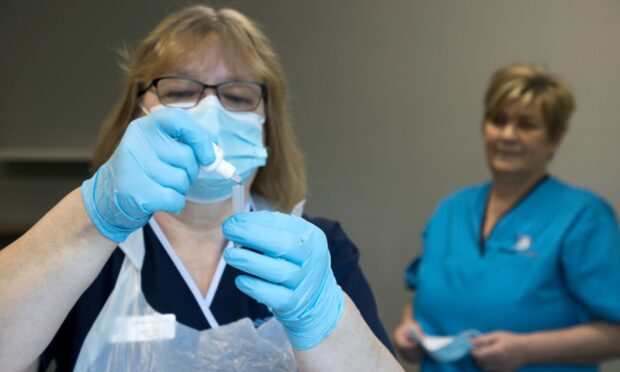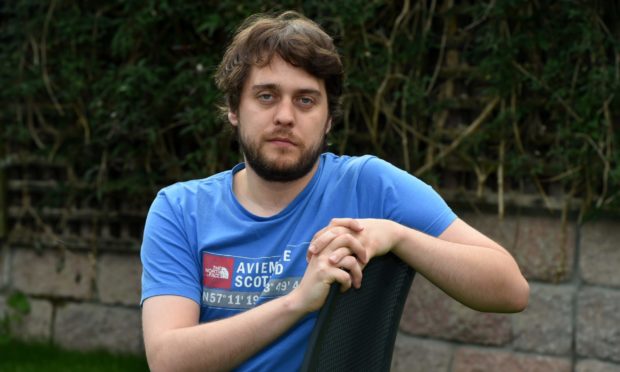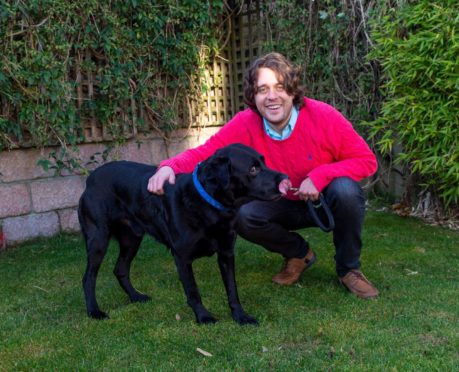An Aberdeen engineer who has spoken out about his “terrifying” ongoing battle with Long Covid has praised the work of a Scottish charity in supporting him.
After falling ill on the first day of the first UK lockdown back in March 2020, 29-year-old poetry enthusiast Callum O’Dwyer was forced to move back in with his parents as he was unable to cook and says he struggled with climbing stairs.
“I felt as though I was wasting away,” Mr O’Dwyer said. “I had no energy to cook and my whole body hurt as if I’d been hit by a bus.”
But after he started sharing his experiences online, Edinburgh-based charity the Thistle Foundation reached out to him to offer support.
Mr O’Dwyer said: “Like a lot of people with Long Covid, I felt alone and terrified of being left high and dry without any treatment.
“It meant a great deal that someone wanted to help me. It looked like the right support too, as their practitioners have many years of experience supporting people with challenging long term health conditions.”
Thistle, who support people with long-term health conditions, says that Long Covid has accounted for 15% of their referrals since December 2020, including Mr O’Dwyer.
Ross Grieve, Thistle’s health and wellbeing manager, said: “We have had an increasing number of referrals of people struggling with persistent, debilitating fatigue after having Covid in recent months.
“Even people who experienced mild symptoms of Covid, and those who expected to bounce back quickly due to their age and fitness, are finding themselves stuck with ongoing symptoms of fatigue, weakness, disturbed sleep and pain.
“Some are left behind in their own personal lockdown just as everyone else is benefitting from being out and about more.”
‘I was hit with a horrible fatigue’
Speaking in January about his symptoms, Mr O’Dwyer said: “Even if I was just sitting in an armchair or lying on my bed, I was gasping for air.
“I felt really unwell and tired all the time but, by around day 12, I started to feel a bit better.
“I was able to do the dishes and take the bins out.
“I was ready to get back to work and, basically, my breathing issues came back and I was hit with this horrible fatigue.
“Then I was even more sick than before.”
Mr O’Dwyer found phonecalls with friends and loved ones draining, and even the act of sending a text message was taking a heavy toll.
While he had support of family dropping off essentials, he was finding it increasingly difficult to properly take care of himself and decided to move back in with his parents.
Even with their support, there were days he was “barely able” to climb their stairs.
Covid cases continue to rise
As Covid cases are rising in Scotland and restrictions are being further relaxed on Monday, latest ONS figures show that over one million people in the UK have reported experiencing Long Covid symptoms, including fatigue, muscle pain, and difficulty concentrating.
A study has also been launched into the long-term effects of Long Covid on people of Scotland.
A month after his initial symptoms, Mr O’Dwyer was still experiencing a wide range of symptoms including breathlessness, fatigue, brain fog, tachycardia, palpitations, tremors, acid reflux and dreadful stomach pains.
“I felt as though I was wasting away,” he said. “I had no energy to cook and my whole body hurt as if I’d been hit by a bus.
“Finally, after five weeks of living alone, I moved back in with my parents. On the first day I could hardly climb the stairs, but not having to worry about cooking and washing-up was a real help.
“My GPs were sympathetic, but no one seemed to know what to do or how long my symptoms would last.”
A year on, Mr O’Dwyer is still getting support from Thistle and is currently doing their 10 week lifestyle management course, gaining further tools to manage his recovery.
He added: “I am able to do more in my life but also trying to stay within my limits. I’ve just been up to the Highlands with my family and was able to do some walking.
“I am still living with my parents but hope to be able to live independently within the next year.
“Having faith in my recovery and being able to talk about the future– not in a scary way but in a productive way – has made me feel much less alone.”
‘Don’t attempt to power through’

Mr Grieve said there’s a real risk if people continue to attempt to “power through” Long Covid symptoms.
He said: “For people affected by Long Covid, it’s really important not to attempt to ‘power through’ as this can make symptoms worse and increase feelings of frustration and loss of control.
“Sticking to a manageable level of activity, resting both your mind and body, and pacing your activity is key to allowing your body to recover.
“This strategy can be really challenging, particularly if we see ourselves as someone who ‘likes to get things done’.”

